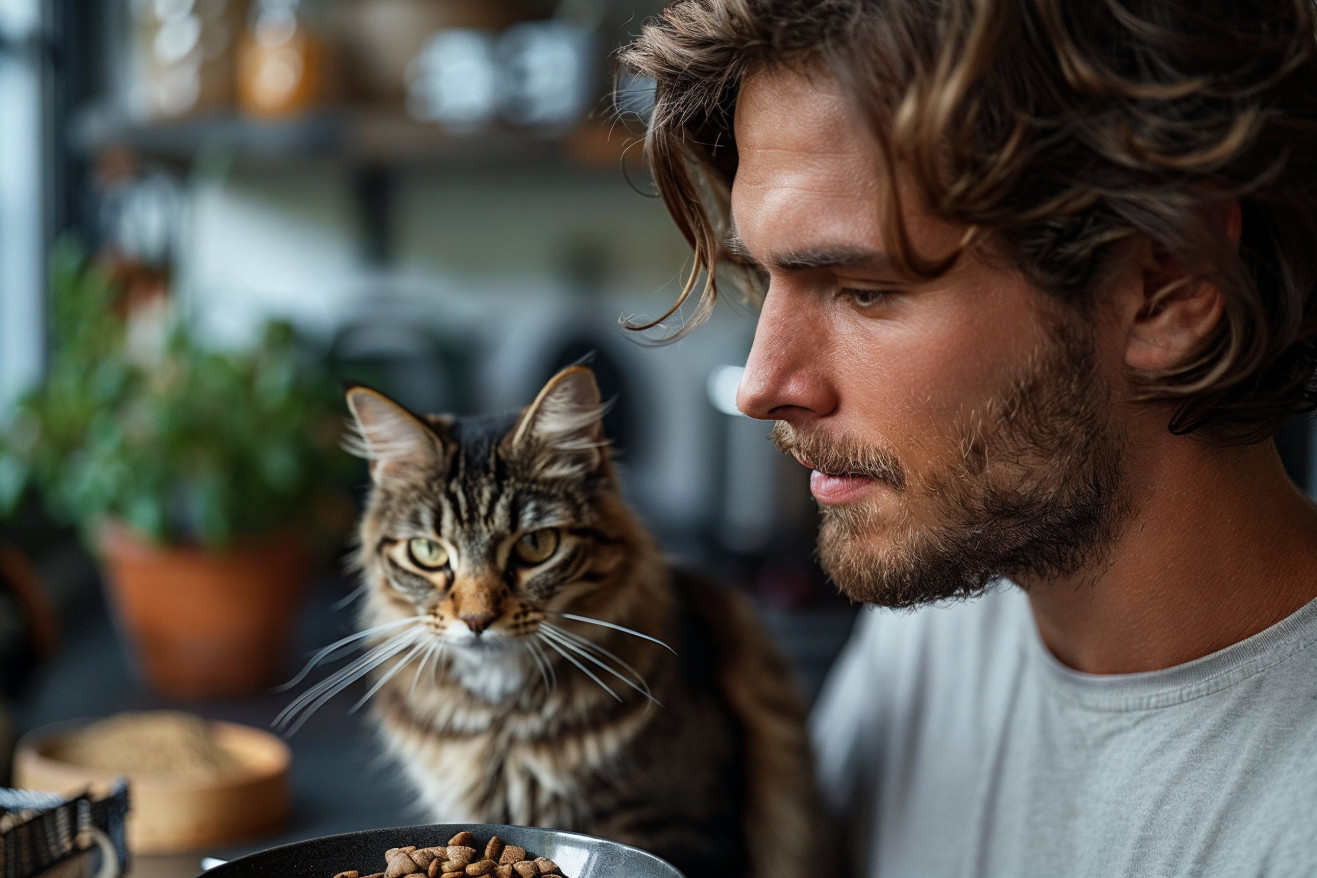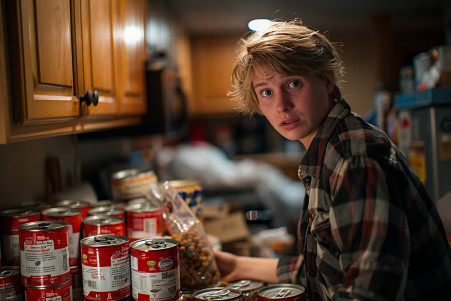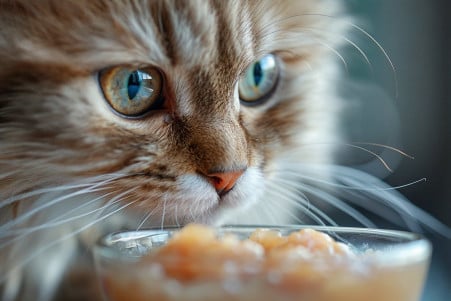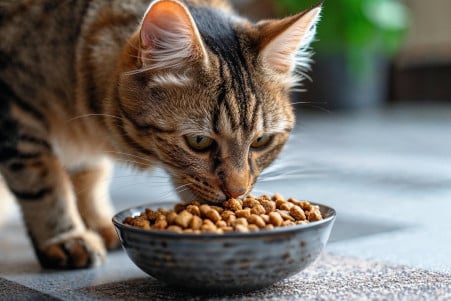Is It Safe for People to Eat Cat Food? An Investigation
13 June 2024 • Updated 11 June 2024

While it is possible to eat, cat food is not a good option for humans because it is formulated to meet the specific nutritional needs of cats. As a result, it is not nutritionally complete for humans. Cat food is high in animal protein, which is great for a cat's obligate carnivore diet, but it is low in the carbs, vitamins, and minerals that humans need. Regularly eating cat food could result in vitamin deficiencies and other health problems.
We'll review evidence-based information from veterinary and human nutritionists that covers the ingredients, manufacturing methods, and nutritional content of cat food and human food. This will shed light on the potential consequences of people eating cat food on a regular basis, enabling you to decide whether this unusual option is a good alternative or an unnecessary risk to your health.
Is it safe for people to eat cat food?
Nutritional Differences: Cat Food vs. Human Food
Cats are obligate carnivores, meaning they need a diet that is high in animal-based protein, moderate in fat, and low in carbohydrates, according to PetMD. Cat food is made to meet these specific nutritional requirements, with an emphasis on animal-based proteins, while human food is made to accommodate a more omnivorous, plant-based diet.
That said, commercial cat foods are also known for their wide-ranging nutrient profiles and caloric densities, and many have excessive amounts of minerals like phosphorus that can be toxic to cats, if not people. In fact, one-third of the senior cat foods tested in one study had phosphorus levels that were considered potentially toxic.
While it's important to look at the nutritional information on labels and make sure that the food you're buying meets AAFCO guidelines, the labels on human food are based on very different nutritional needs. As a result, making your own cat food or feeding your cat human food on a regular basis is not recommended by veterinarians, as it may not provide the complete and balanced nutrition that cats need as obligate carnivores.
In the end, even if there is some overlap in the ingredients used in cat and human foods, the nutritional content and how they are formulated is very different and tailored to the specific nutritional needs of each species. As a result, regularly substituting cat food for human food could lead to nutritional imbalances and deficiencies.
Health Risks of Eating Cat Food for Humans
While eating cat food occasionally is unlikely to cause any harm, it is not recommended as a regular part of the human diet. This is because cat food is made with ingredients like meat by-products and ash that are not considered safe or healthy for humans to eat, according to the American Dietetic Association.
Eating cat food over the long term can also lead to nutritional deficiencies since it is not designed to meet human nutritional needs. In addition, there is a risk of foodborne illnesses and vitamin imbalances from eating cat food since it is not held to the same safety standards as human food, according to a study on the risks of raw pet food.
People who are especially vulnerable, including pregnant women, infants, the elderly, and people with weakened immune systems, are more likely to experience complications from eating raw or contaminated pet food. Dogster also notes that the lack of regulation and the use of potentially harmful ingredients in pet food can make it especially risky for humans to eat on a regular basis.
Symptoms and Treatment of Eating Too Much Cat Food
Most cases of food poisoning from eating cat food that has been contaminated can be treated at home with rest, fluids, dietary changes, and over-the-counter medications, says Healthline. However, if food poisoning is severe, it may require hospitalization for treatment with intravenous (IV) fluids or mechanical ventilation due to prolonged diarrhea, a high fever, vision or speech impairment, or severe dehydration.
People with compromised immune systems, such as those with HIV/AIDS or those undergoing cancer treatment, are more likely to experience complications from toxoplasmosis, a parasite found in raw or undercooked meat and pet food, notes the Mayo Clinic. Severe toxoplasmosis can lead to vision loss, confusion, seizures, and damage to the organs and should be treated by a doctor as soon as possible.
Otherwise healthy people may also be at risk of other zoonotic diseases, including salmonellosis, visceral larva migrans, and giardiasis, which can be transmitted by eating cat food that has been contaminated and cause diarrhea, fever, abdominal pain, skin irritation, and neurological symptoms, according to the Cornell University College of Veterinary Medicine.
What to Eat Instead of Cat Food
Instead of eating cat food, which is not safe or healthy for humans to eat, there are plenty of other options that will provide the nutrients you need without the risks. Some of the human foods that are safe for cats to eat in moderation, like cooked meats, fish, eggs, and certain fruits and vegetables, are also part of a healthy human diet, according to The Honest Kitchen.
That said, it’s important to avoid giving cats (or people) foods that are toxic or unhealthy for them, including onions, garlic, chocolate, grapes, and foods that are high in fat or sugar. For cats, it’s best to stick to reputable pet food brands that are specially formulated to be nutritionally complete and balanced rather than trying to make homemade cat food or feeding them a diet that’s mostly made up of human food, according to The Wildest.
For people, a well-rounded diet that includes a variety of nutrient-dense whole foods from all the food groups, including lean proteins, whole grains, fruits, and vegetables, is the best way to ensure you get the nutrients you need, according to the experts interviewed for this article. While some human foods are safe for cats to eat in moderation, cat food is not a healthy alternative to a well-balanced human diet.
Conclusion: The Risks Aren't Worth It
While cat food is technically safe to eat, it is not formulated for human consumption and does not contain the essential nutrients that humans need to stay healthy. Regularly eating cat food can lead to nutritional deficiencies, foodborne illnesses, and other health problems, especially for people with compromised immune systems.
As the Catster article explains, while there's nothing in cat food that should kill you or cause an immediate and awful reaction, the formulation is not right for humans. The Live Science article also points out that while uncontaminated pet food is safe in the short term, long-term consumption can lead to nutritional deficiencies.
While eating a small amount of cat food probably won't cause any immediate problems, it is not recommended as part of a regular human diet due to the many risks associated with it. Instead, people should eat a varied, balanced diet that includes whole, nutrient-dense foods from all food groups, as the experts in this article recommend.
In the end, the risks of eating cat food as a human are not worth it and there are no real benefits to doing so. The nutritional needs of humans and cats are not the same, and cat food is not formulated to meet the dietary requirements of people.


